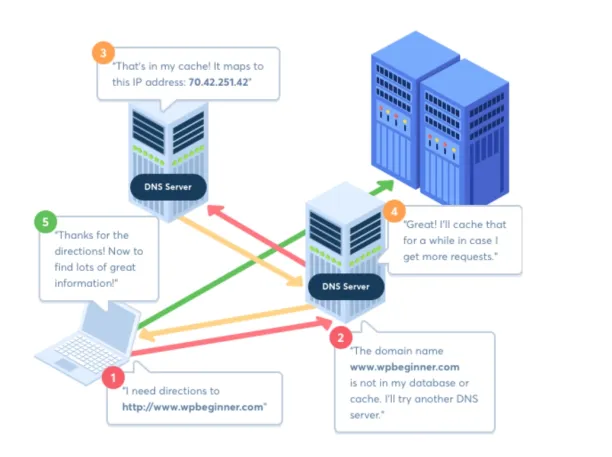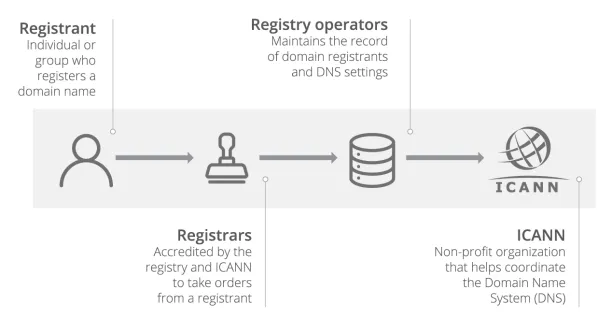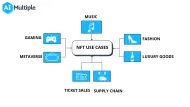Crypto Domain Name (DNS) providers are gaining popularity, with over 2 million “.eth” domains already registered in 2025. DNS providers allow users to register and manage domain names linked to blockchain networks. These services also offer tools for utilizing decentralized websites for seamless integrations with Bitcoin wallets.
What are crypto domains?
Crypto domains are NFTs that function as universal addresses for crypto wallets and websites, which is why they are also referred to as NFT domains. Unlike traditional domains, crypto domains are not stored on a server but on a blockchain.
Namecoin (2011) was one of the early attempts to create a decentralized DNS using blockchain technology to enable users to control their own domains without relying on a central authority.
This early innovation laid the groundwork for developing other blockchain-based domain systems, such as Ethereum Name Service (ENS) and Unstoppable Domains, which aimed to provide a more censorship-resistant, and user-controlled alternative to traditional DNS.
Top 10+ crypto domain name examples
| Crypto domain name provider | Blockchain |
|---|---|
| Ethereum Name Service (ENS) | Ethereum |
| Namecoin | Namecoin |
| Blockchain Domains by Coinlink | Ethereum, Solana |
| SOL Domain | Solana |
| Zilliqa Name Service (ZNS) | Zilliqa |
| Cardano Name Service (CNS) | Cardano |
| Diode | Polkadot |
| Unstoppable Domains | Ethereum, Polygon, Zilliqa |
| PeerName | Bitcoin (via Namecoin) |
| Emercoin | Emercoin |
Ethereum Name Service (ENS)
ENS provides crypto domains on the Ethereum blockchains. Sending and receiving cryptocurrencies are possible with ENS domains. The main suffix of ENS is .eth. For example, Budweiser bought Beer.eth for roughly $95,000.
ENS records are tamper-proof, offering enhanced security compared to traditional DNS. It integrates seamlessly with Ethereum wallets and decentralized apps (dApps).
Namecoin
Namecoin is one of the earliest blockchain-based domain services, operating on the Bitcoin blockchain.
It offers decentralized domains with extensions like .bit, providing a secure, censorship-resistant alternative to traditional DNS. Namecoin emphasizes privacy and security for domain owners, ensuring full ownership and control over their domains.
Blockchain Domains by Coinlink
Blockchain Domains by Coinlink is a multichain decentralized finance (DeFi) platform that connects various DeFi services. It integrates services from major blockchains such as Ethereum, Cardano, Polygon, and Avalanche.
It aims to offer a unified platform where users can access and manage all their DeFi activities in one place, similar to using a mobile banking account. Supports 275+ cryptocurrencies for payment integration.
SOL Domain
SOL Domain is a decentralized domain service designed specifically for the Solana blockchain. It grants users a “.sol” domain name (e.g., ExampleUser.sol) which can be used as an alternative to a public key or wallet address for Web3 applications and NFTs. These domains are directly connected to Solana blockchain addresses.
Zilliqa Name Service (ZNS)
The Zilliqa Name Service (ZNS) is a suite of smart contracts to make a naming system like DNS on the blockchain and provides decentralized domain names with “.zil” extensions.
Cardano Name Service (CNS)
CNS is a domain name service built on the Cardano network. It provides domain names ending with the .ada suffix.
CNS allows domain owners to create up to five virtual sub-domains, offering multiple access points to manage resources.
Diode
Diode focuses on decentralized identity solutions, allowing users to create unique identifiers that enhance privacy and security in digital interactions.
It provides tools for enhancing security and collaboration across teams and systems:
- Diode Vault: A small appliance or cloud-based tool that combines the functionalities of the App, backups, and geo-access for teams and assets.
- Diode Collab(App): A collaboration tool for teams that enables secure communication and file sharing with end-to-end encryption (E2EE), helping replace insecure chat apps and securely managing operations like server dashboards.
- Diode CLI: A command-line interface tool for securing OT, IT, and IoT devices.
Unstoppable Domains
Unstoppable Domains provide domains with endings such as .crypto & .nft. They claim to have registered more than 2.4 million domains. Domains are stored as NFTs in crypto wallets and can be used for sending and receiving payments with 275+ supported cryptocurrencies.
The platform integrates with Fireblocks for enhanced security, using an MPC wallet that ensures private key safety across multiple locations. Additional features include remote wallet deactivation and secure recovery options.
PeerName
PeerName enables users to register blockchain-based domains across multiple blockchain networks. PeerName offers the first year of registration for free, making it more accessible to new users. Key features:
- Supported domain extensions: PeerName supports various domain extensions, including .bit, .coin, .bazar, .emc, .lib, and .onion, providing diverse options for domain registration.
- Multi-blockchain support: PeerName allows users to manage domains across various blockchain networks.
- Cold storage security: Domains are stored in cold storage, keeping them offline and protected from hacking.
Emercoin
Emercoin is a blockchain platform that provides numerous services, including EmerDNS for decentralized domain registration. It supports hybrid mining, utilizing a combination of Proof of Work (PoW), Merged Mining, and Proof of Stake (PoS) to ensure network security and efficiency.
In addition to EmerDNS, Emercoin offers services like EmerSSL for secure communications and EmerDPO for anti-counterfeit solutions.
How do traditional domains work?
Traditional domains are registered in a domain name system (DNS) server, which connects the IP addresses to a domain. When a domain is searched in a browser, it connects to the DNS. The DNS connects the domain with the IP addresses in its database and shows the result to the user (See Figure 1).
Figure 1: How a domain name works

Domains have two parts:
- The domain name. For example, in Aimultiple.com, AIMultiple is the domain name.
- Top-level domain (TLD). There are many TLDs, but the most well-known ones are .com, .org and .net. TLDs are managed and maintained by Internet Corporation for Assigned Name and Numbers (ICANN), which is an American non-profit organization. ICANN delegates the management of domains to registrars, which are companies that rent domains to businesses and individuals. (Figure 2)
Figure 2: Traditional domain ecosystem

Traditional DNS (Domain Name System) vs. Crypto domains
1. Complexity
- Traditional DNS: Converts IP addresses into human-readable names (e.g., “www.example.com”). It simplifies website access, but the actual addresses behind them are still IP-based.
- Crypto domains: Replace long, alphanumeric blockchain addresses (e.g., “0x12345…”) with human-readable names like “bob.crypto” or “alice.eth.”.
2. Centralization vs. decentralization
- Traditional DNS: Centralized control by registrars and internet service providers (ISPs).
- Crypto domains: Decentralized and built on blockchain technology. Users have full ownership of their domains, and no single entity controls or can censor access. Domains are immutable and censorship-resistant.
3. Security
- Traditional DNS: Vulnerable to attacks such as DNS spoofing, DNS hijacking, and DDoS attacks. Since DNS is centralized, a breach or failure can expose sensitive user data and cause service disruptions.
- Crypto domains: Utilize blockchain’s cryptographic features, offering stronger security for domains. Records are stored immutably on the blockchain, reducing the risk of hacking.
4. Ownership control
- Traditional DNS: Domain ownership is controlled by third-party official registrars and can be suspended by these central entities.
- Crypto domains: Users have complete control over their domains, as they are stored as NFTs on the blockchain. Domain ownership is tied to the user’s wallet.
5. Censorship resistance
- Traditional DNS: Since it is centralized, domain names can be blocked by a central authority. This creates a risk of censorship, especially in countries with strict internet regulations.
- Crypto domains: Blockchain-based domains are resistant to censorship thanks to decentralization.
6. Tokenization
- Traditional DNS: Domains are registered and managed by third-party registrars and are not represented as transferable assets. Users don’t have actual ownership; they only lease the domain from the registrar.
- Crypto domains: Domains are represented as NFTs (Non-Fungible Tokens), meaning they are fully owned by users and can be transferred, traded, or sold on blockchain-based marketplaces.
7. Integration with decentralized applications (dApps)
- Traditional DNS: Primarily designed for centralized websites and services, making it harder to integrate with decentralized platforms.
- Crypto domains: Seamlessly integrate with decentralized applications (dApps), enabling users to easily access and interact with Web3 services, blockchain wallets, and decentralized websites.



Comments
Your email address will not be published. All fields are required.